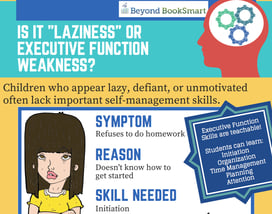Editor's note: This week, we feature guest blogger Samantha Kolkey, a licensed social worker and Director of Programs at Options for College Success. She has been helping students with learning difficulties to build self-esteem for many years. Please see her full bio below.
I'd like to reveal to you a few examples of conversations I have had or overheard during my six years as a social worker serving individuals with learning difficulties.
my six years as a social worker serving individuals with learning difficulties.
Tutor: Why didn’t you complete the assigned reading last night?
Student: It takes me so long to read a small number of pages. It’s embarrassing, so I just don’t do it.
• • •
Parent: Why didn’t you go to your job today? You could be fired.
Teen: I don’t know. I just couldn’t get up on time, so I didn’t go.
• • •
Social worker: Your mom told me that you had trouble at school today.
Child: There were so many math problems that I just didn’t understand, so I didn’t do the homework. The teacher said that I was lazy for not doing the work and told me to leave the classroom so I wouldn’t be a bad influence to the rest of the class.
• • •
Young adult: I can’t get a job because I don’t have my high school diploma. I have all the skills for the job, but they said I have to have my GED.
Social worker: I can help you find someone to prepare you to take the GED.
Young adult: No, I’m not doing it!
Social worker: Why do you not want to take the next step to get the job you want?
Young adult: (After a long pause) Why? Because my high school teachers told me that I’m stupid, lazy, and that I don’t care! So, what’s the point? Plus, it’s embarrassing. Everyone will see that I’m worthless.
• • •
Did you notice a pattern? From an outside perspective, the student who faces long-standing learning challenges may present as not caring about responsibilities, constantly procrastinating no matter the consequences, lacking motivation, isolating themselves, or acting out. Based on my work with students with learning difficulties, I have noticed a theme: students struggling with learning challenges often have an underlying negative self-image, feelings of worthlessness, and a lack of confidence in themselves. Even with the appropriate academic accommodations, the student may view themselves as failing, or may fear social stigma by peers. Some students define themselves based on their learning challenge or disability, creating the harmful self-labeling of being stupid or a failure.
The Long-Term Impact of Hearing “You’re Lazy,” “You’re Stupid,” and “You Can’t Do This”
Learning differences and disabilities are often thought of primarily with regard to their educational repercussions; however, a student's socialization, communication, and self-esteem are also deeply affected. In my career providing support and counseling for individuals age 30 and under, I have seen the complex layers involved in how learning difficulties impact self-esteem, and the influence of these layers on development as the individual grows and matures.
The shame and stigma of being labeled as a student with learning difficulties can follow people into adulthood, impacting their interactions and confidence post-schooling. Teachers and parents can sometimes feel frustrated when working with students with learning challenges such as ADHD. Young children can sense annoyance from adults about what they do and who they are. This has a lasting impact on emotional and social development. To counter this, it’s important to instill confidence and self-esteem for an individual with learning differences. When students feel positive about themselves, they are more likely to establish healthy relationships with friends and partners, set goals for the future, and take healthy risks that lead to personal growth.
How to Help a Student With Learning Difficulties Build Self Esteem
There are a number of ways we can all contribute to our students’ sense of self-esteem.
- Make sure the student understands the nature of their learning challenge. Encourage questions and normalize this topic of discussion. If adults show discomfort with the idea of a child having a learning disability, the child will feel uncomfortable too.
- Finding a positive social outlet or peer group with similar interests for your student can increase their self-esteem and feelings of social acceptance. It also provides opportunities to practice social and communication skills. Whether it’s a robotics club, sports activity, performing arts, or other involvement, channeling your student’s energies into an extracurricular activity helps them to explore their strengths outside of school.
- It is important for parents to communicate with their student’s teacher to let them know what challenge is being faced and what tools may help your child to learn and achieve successes. If your student is in high school or college, you can assist them in emailing or setting up a meeting with the teacher for them to inform their teacher of their challenges and needs.
- Set realistic and achievable goals in school and at home. If goals are set too high or are not achievable in a short time, it can be demotivating for a student. Successfully achieving a goal is motivating and can lead to more successes and increased confidence.
- At the dinner table or breakfast table, practice “I’m proud” statements to encourage a positive perspective and healthy outlook. Each person shares an accomplishment that made them proud. It can be as small as “I’m proud that I made it to school/class on time,” or “I’m proud I made my lunch.”
- Decrease the focus on what they are NOT doing and focus more on acknowledging your child for accomplishments. Specifically identify what is being praised: “You worked hard and spent 45 minutes straight reading this afternoon!”
Students with learning difficulties need to believe for themselves that they are valuable and important. When individuals experience healthy self-esteem, they feel ready to try new things, engage in conversations and social groups, make decisions to improve themselves and their lives, and treat themselves with respect.
Do you know a student who is struggling in school? Contact us for free consultation to see if Executive Function coaching might help improve their grades and their self-esteem.
Samantha Kolkey is the Executive Director for All Kinds of Therapy, a non-profit organization providing all-encompassing services to individuals 17 and older with learning challenges and disabilities. She is a licensed social worker who has a combined six years of experience working with children, youth, and families. Samantha is passionate about helping individuals develop the confidence and courage to live their best lives. Samantha received her B.A. in Psychology and Women’s Studies from the University of Michigan in Ann Arbor, Michigan, and her Master’s in Social Work from Jane Addams College of Social Work at the University of Illinois-Chicago.
Did you know that children who appear lazy or unmotivated often lack self-management skills? Click the button below the image to download our new infographic featuring 5 common symptoms of Executive Function weakness.


